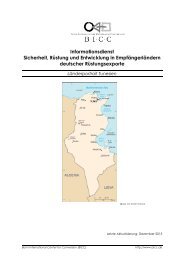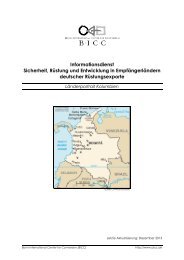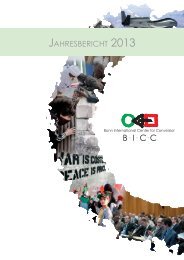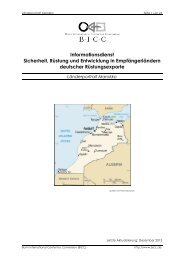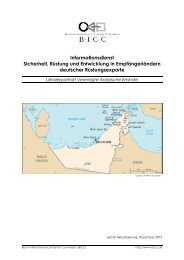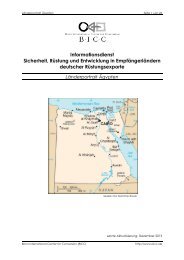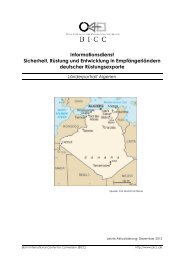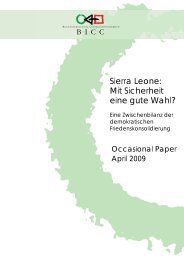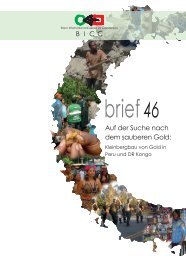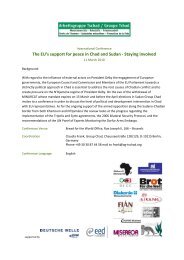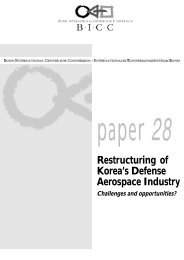English - BICC
English - BICC
English - BICC
You also want an ePaper? Increase the reach of your titles
YUMPU automatically turns print PDFs into web optimized ePapers that Google loves.
Times, 13 March 1995, 18 March 1995).<br />
Other responses included calling on<br />
the Irish government to “face up to”<br />
the British on the issue (Irish Times, 28<br />
August 1995), appealing to the international<br />
community to pressurise Britain<br />
and kick start the process (Irish Times, 2<br />
October 1995), calling for widespread<br />
street protests (Irish Times, 17 April<br />
1995), writing off the present British<br />
government and waiting for a Labour<br />
administration (Irish Times, 26 July<br />
1995), and hinting that calls for<br />
decommissioning were jeopardising the<br />
ceasefire (Irish Times, 17 April 1995).<br />
Republicans also mirrored the British<br />
tactic of stressing the immutability of<br />
their position on decommissioning.<br />
Sinn Fein stated that the<br />
decommissioning question was<br />
“pointless” and that they had “no<br />
room to manoeuvre” on the issue;<br />
moreover, as Martin McGuinness<br />
claimed, even if the IRA surrendered<br />
only a tiny percentage of its weaponry,<br />
“Believe me when I tell you the<br />
communities where we come from<br />
would see the IRA as a laughing stock”<br />
(Irish Times, 17 October 1995, 5<br />
September 1995; Sunday Independent, 10<br />
September 1995). The IRA was even<br />
more succinct: “The new and<br />
unreasonable demand for a hand over<br />
of IRA weapons” was “ludicrous”<br />
(Irish Times, 30 September 1995).<br />
Republican response to the proposed<br />
international commission to examine<br />
the question of arms was less than<br />
exultant. Reaction varied from lukewarm<br />
commitments to seriously<br />
consider the proposal (Irish Times, 28<br />
August 1995) to suspicion that the<br />
commission might be used as a device<br />
to achieve the surrender of IRA<br />
weapons (Irish Times, 1 September<br />
1995). Similarly a statement from the<br />
IRA after the proposal was formally<br />
launched by the two governments<br />
stated that “British bad faith and<br />
Unionist intransigence have raised a<br />
huge question mark over the potential<br />
of the twin track approach”; following<br />
from this there was to be no “surrender<br />
of IRA weapons either through the<br />
front or back door” (Irish Times, 8<br />
December 1995).<br />
This reflected a rapidly growing unease<br />
within the Republican rank and file,<br />
that the peace process was a “sham”<br />
and going nowhere (Irish Times, 29<br />
August 1995, 28 September 1995). All<br />
through the ceasefire, the IRA had<br />
maintained its organisational integrity<br />
and underlined the fact that it had not<br />
left the ‘battlefield’ by conducting<br />
‘punishment’ attacks against alleged<br />
criminal elements; in fact the number<br />
of ‘punishment’ attacks by Republicans<br />
had doubled in the fourteen months<br />
after the ceasefire (Irish Times, 7<br />
December 1995). Such displays of<br />
enduring militancy were no longer<br />
sufficient in themselves in a period of<br />
decaying Republican confidence, and<br />
between April 1995 and January 1996,<br />
six alleged drug dealers were killed by<br />
the IRA. These actions, it is suggested,<br />
resulted from a changing balance of<br />
forces within Republicanism (Bew and<br />
Gillespie, 1996, pp. 145–146), one<br />
which had never been entirely sold on<br />
the peace, and which was particularly<br />
incensed by the ever-present question<br />
of decommissioning.<br />
On the spotlight’s<br />
edge: Ulster Loyalism<br />
and decommissioning<br />
In contrast, Loyalists carried out fewer<br />
‘punishment’ attacks in the period after<br />
the ceasefire than before it. Although<br />
they were as insistent as Republicans<br />
that it was “naïve” to consider the<br />
disposal of weaponry at this stage of<br />
the process (Irish Times, 14 March<br />
1995), the issue was not such a vexing<br />
one for them. Certainly, less pressure<br />
seems to have been exerted on them to<br />
decommission. In part, this was due to<br />
the nature of their own ceasefire,<br />
which differed from the IRA’s in a<br />
number of ways. Loyalists had publicly<br />
expressed “abject and true remorse” to<br />
the families of its innocent victims and<br />
had also underlined that they would<br />
“not initiate a return to war. There<br />
B·I·C·C<br />
origin of the issue<br />
[would] be no first strike” (Bew and<br />
Gillespie, 1996, pp. 72–73, 114).<br />
These moves served to deflect criticism<br />
and inspire a good degree of<br />
confidence in their ceasefire, despite<br />
the fact that they had killed more<br />
people than Republican groups in the<br />
years 1993 and 1994. Loyalists were<br />
self-consciously portraying themselves<br />
as a strategically reactive force that<br />
would only be activated if Republicans<br />
returned to war or if there was a sell<br />
out by the British government. Given<br />
that the upbeat prognosis of Loyalist<br />
groups was that the union was safe,<br />
this meant that their ceasefire would<br />
last as long as the IRA wanted it to.<br />
Another Loyalist response to the<br />
demand for decommissioning was to<br />
simply point the finger at the IRA and<br />
state that it was “inconceivable” for<br />
Loyalists to decommission whilst there<br />
existed a “fully operational, heavily<br />
armed Republican war machine intact<br />
and refusing to relinquish their<br />
arsenals” (Belfast Telegraph, 25 August<br />
1995); thus there could be “no<br />
movement until Republicans address<br />
the fears which exist within [the<br />
Loyalist] community” (Belfast Telegraph,<br />
3 November 1995).<br />
In one analysis, Loyalists felt less<br />
pressured on matters like<br />
decommissioning because they were<br />
treated differently by the British, who<br />
reserved an “evolutionary” and<br />
“clinical” approach towards Loyalism<br />
that was lacking in their more<br />
“emotional” attitude to Republicans<br />
(Mallie and McKittrick, 1997, p. 384).<br />
Furthermore, Loyalists never<br />
subscribed to the Republican view that<br />
the Washington 3 test represented<br />
diplomatic warfare or Unionist<br />
intransigence, but rather understood<br />
Unionist concerns about IRA<br />
intentions; decommissioning was not<br />
seen as political bludgeon but rather a<br />
natural, if naïve, reflex. Ultimately,<br />
Loyalism preferred to watch the<br />
disarmament wrangling from the<br />
shadows of the political stage,<br />
confident that it was the Republicans,<br />
with their superior arsenal, who were<br />
caught in the spotlight.<br />
21



